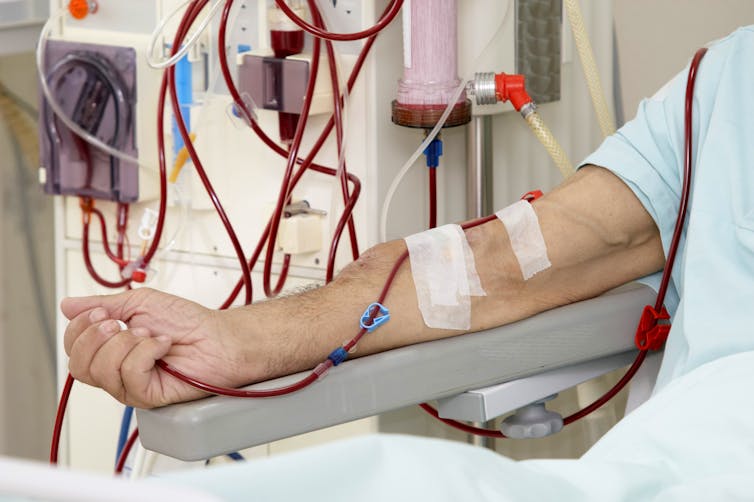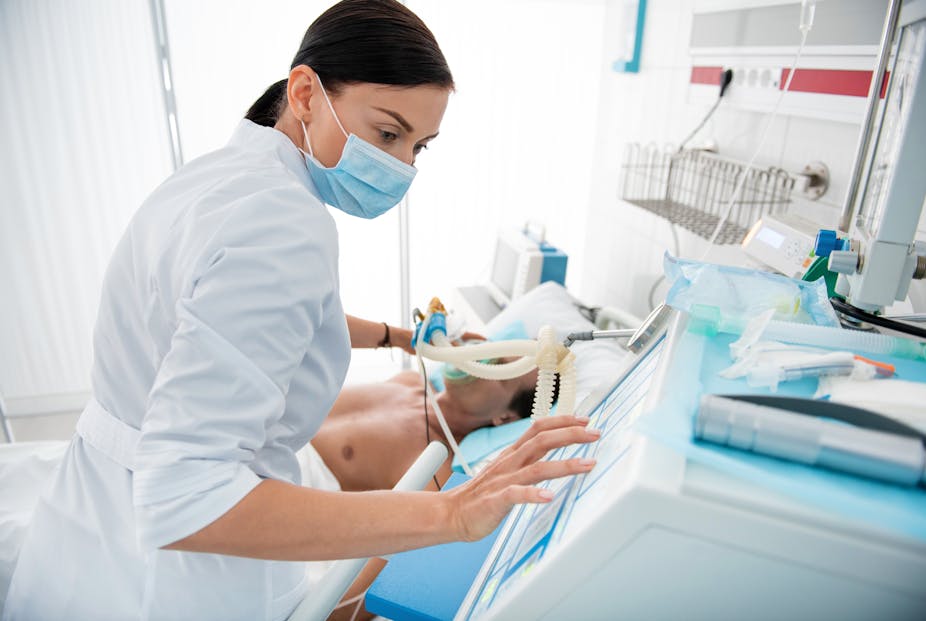The coronavirus pandemic is causing major healthcare issues for patients with kidney diseases throughout the world. Not only are these patients more likely to have severe complications if infected with COVID-19, anxiety because of the pandemic is also causing many patients not to seek medical care or advice for fear of contracting the virus.
Patients with chronic kidney disease are recognised by the NHS as being at a high risk from coronavirus. Recent data also shows that patients needing dialysis have higher mortality from COVID-19 than patients who don’t have kidney disease.
There are a number of potential reasons why patients with kidney disease are more likely to suffer severe complications if they contract COVID-19.
First, they’re more likely to have a cardiovascular disease caused by their kidney disease, including high blood pressure and susceptibility to heart attacks and strokes. Cardiovascular disease is known to increase your risk of death if you contract COVID-19. This is likely due to the increased stress the patient’s damaged cardiovascular system is subjected to, and unable to cope with, when the lungs are no longer able to provide enough oxygen to the body.
Patients with advanced kidney disease are also more likely to be diabetic. Diabetes can cause severe cardiovascular issues and has also been found to put patients at risk of developing complications from COVID-19.
Second, patients with kidney disease are commonly immunosuppressed – meaning they are less able to fight infections. This can be due to their underlying kidney disease or because they need to take medicines to treat their on-going kidney disease by suppressing their immune system. These drugs are crucial after a kidney transplant to ensure the body’s immune system doesn’t reject the new kidney.
A suppressed immune system may make the body less able to clear the virus when infected. However, there’s also some evidence that an “over-active” immune system after the first few days of infection causes more severe COVID-19 complications. Lessening the immune system’s response using immunosuppressive drugs may be beneficial – which is why multiple clinical trials are currently investigating this.
Finally, there’s a higher proportion of men and people from black, Asian and minority ethnic (BAME) groups with severe kidney issues, requiring kidney dialysis or a transplant. These factors have been shown to predict a worse outcome with COVID-19 infection.
Current data from China, Italy and Spain shows children are much less likely to die of a COVID-19 infection compared to adults. This may possibly be due to the younger, evolving immune system being better at dealing with and clearing new viral infections.
However, children with kidney diseases may still be at higher risk of getting severely ill from coronavirus. But their risk may be lower compared to adults, as many children with kidney disease don’t have a coexisting cardiovascular disease or other risk factors. Currently, in the UK, there are no reports of children with kidney disease experiencing severe complications from COVID-19.
Healthcare changes
Given that many adults with kidney disease face increased risk of contracting severe COVID-19 infections, it’s important that patients try to protect themselves from the virus as much as possible. Children with advanced kidney disease or who are heavily immunosuppressed are advised to take similar precautions.
It’s especially important to find ways to protect patients with kidney failure who need to regularly attend hospital for haemodialysis (or blood cleaning) treatment, often three to four times per week. Careful planning is needed to minimise unsafe human contact during dialysis delivery.

The current pandemic has caused widespread anxiety and changes to the ways in which healthcare is being delivered. There’s been a dramatic decrease in patients attending hospital or seeking medical advice if unwell due to a fear of contracting COVID-19. This could have a detrimental cost to those with kidney disease. Many kidney transplant programmes have even been suspended, limiting treatment options for people with severely impaired kidney function (particularly those on dialysis).
Patients with kidney disease may also be worried about taking their regular medications, in case they may put them at greater risk of contracting COVID-19. An example of this are angiotensin converting enzyme (ACE) inhibitors, a drug that treats hypertension and reduces levels of protein in urine. These are both key to maintaining good cardiovascular and kidney health. ACE inhibitors block the stimulation of a receptor that is found on cells called the ACE2 receptor. The coronavirus, which causes COVID-19, gains entry to cells by going through this receptor.
Read more: What we know about ACE inhibitors, high blood pressure and COVID-19
Currently, there’s no evidence that taking ACE inhibitors is beneficial or detrimental to coronavirus. Patients should know that stopping these medicines could have detrimental consequences for kidney and cardiovascular disease health.
Current evidence suggests that adult patients with significant kidney disease are highly susceptible to the effects of COVID-19. People with kidney conditions should take more stringent precautions to protect themselves from the virus and prevent infection, such as staying at home, properly washing hands and avoiding direct human contact as much as is possible.

